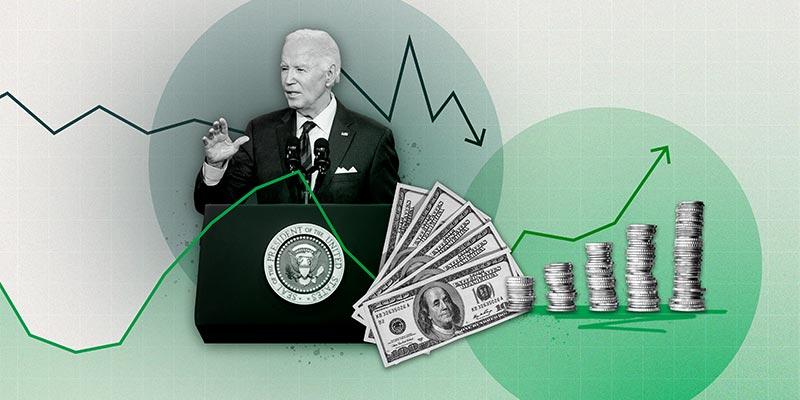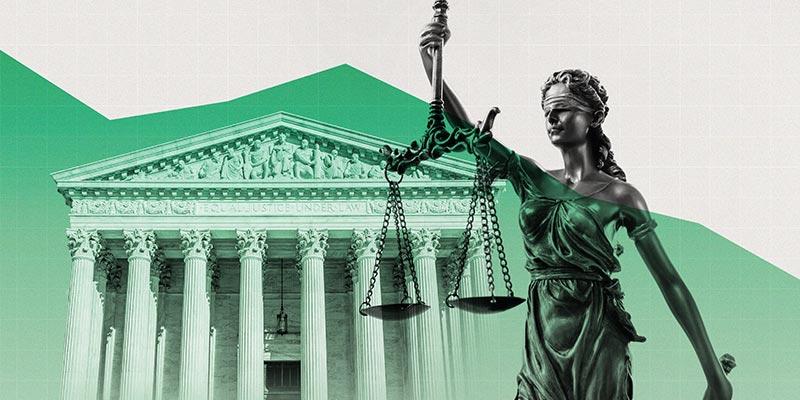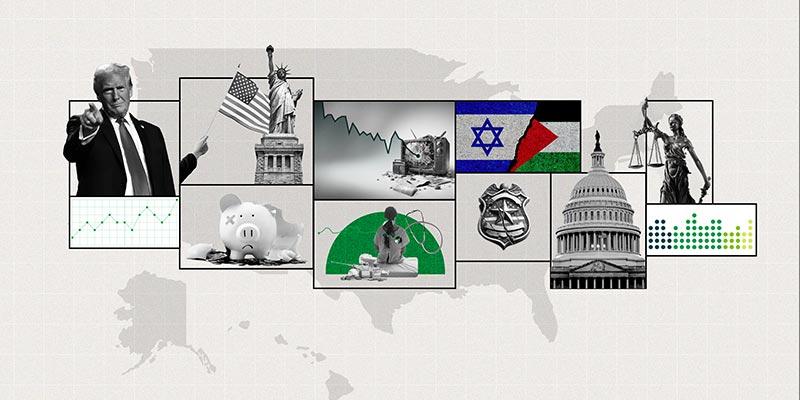WASHINGTON, D.C. -- In line with public opinion throughout 2024 and stretching back to 2021, Americans close out the year disapproving of the jobs President Joe Biden and Congress are doing, rating the economy negatively, and feeling dissatisfied with the direction of the country.
The following sections cover key findings among several national mood indicators from ║┌┴¤═°’s final poll of 2024, conducted Dec. 2-18. The poll ended just as political turbulence erupted in Washington, D.C., over the details of a federal spending package needed to avert a government shutdown and before a bill passed on Friday with bipartisan support.
Biden's Job Approval
About four in 10 Americans (39%) approve of the job Biden is doing as president, similar to the 37% he received in November and his 41% rating in late October.
While on the low side for the 36% to 45% range of approval ratings he’s received since January 2022, Biden’s current reading is similar to his average over that period. He hasn’t had a job approval rating of 50% or better since July 2021.
║┌┴¤═° will conduct its final reading of Biden’s job approval in January. For now, it appears he leaves office earning majority-level approval from a handful of U.S. subgroups, including Democrats (85%), political liberals (73%), adults with postgraduate education (55%), people of color (53%) and people with no religious affiliation (51%). Majorities of Republicans, conservatives, White adults and those without a college degree disapprove of his job performance, as do majorities of all age and income groups.
Congressional Job Approval
Congress’ job rating remains below 20%, as it has for most of 2024, with 17% of Americans approving in December. Although approval of Congress reached 20% in September, it had dipped to 12% in February and 13% in May.
Congressional job approval was higher at the start of Biden’s first year, when Democrats controlled both the House and Senate. However, it soured by the end of the year after the Democratic majority failed to pass key pieces of Biden’s legislative agenda. Congressional approval partially recovered a year later after Democrats passed the Inflation Reduction Act, but it went south again after Republicans won back the majority in the House in the 2022 midterm election and Congress was again split.
Albeit low, Democrats’ current 23% approval rating of Congress is higher than Republicans’ 10%.
Satisfaction With Direction of the Country
Nineteen percent of Americans say they are satisfied with the way things are going in the U.S., slightly lower than the 22% to 26% readings in recent months and the lowest since July.
Reflecting Democratic losses on Election Day, Democrats’ satisfaction with the direction of the country fell 16 percentage points between October and November, from 47% to 31%. At the same time, Republicans’ satisfaction rose from 5% to 16%.
This month, Republicans’ satisfaction retreated to 9%, while Democrats’ was flat. Meanwhile, across the entire pre- and post-election period -- and, in fact, all year -- independents’ satisfaction has been fairly steady, near 20%.
Economic Confidence
As indicated in ║┌┴¤═°’s Economic Confidence Index, Americans have been downbeat about the U.S. economy throughout all but the very beginning of Biden’s presidency. The index is the average of Americans’ net-positive evaluation of current economic conditions and their net-positive view of the economy’s direction. The index has a theoretical range of +100 (if all Americans rate current conditions as excellent or good and say the economy is getting better) to -100 (if all Americans rate the economy as poor and say it is getting worse).
After registering slightly positive scores early in 2021, the index descended to -58 by June 2022, as inflation mounted to 9.1%, a 40-year high. The index has since been slowly improving, registering -26 in ║┌┴¤═°’s final preelection reading in October. It then jumped to -17 in the first few weeks after the election in November and is at -14 today, the highest since August 2021.
The improvement recorded in November was largely owed to a surge in Republicans’ confidence, rising to -43 from -72 in October. Economic confidence improved less markedly immediately after the election among independents, from -34 to -25. While remaining positive, confidence fell 10 points among Democrats in November to +27.
This month, independents’ confidence in the economy showed further improvement to -13, while Democrats’ and Republicans’ scores were largely unchanged.
Perceived Top U.S. Problem
There has been little change over the past month in the issues Americans cite as the most important problem facing the country: The government is mentioned by 20%, immigration by 17%, the economy in general by 15% and inflation by 11%.
However, a smaller share of Americans today than in September and October name the economy in general, inflation or immigration as the top problem. Meanwhile, slightly more cite the government as most problematic. The latter category includes a substantial segment citing concerns about incoming President Donald Trump or the Republican Party generally, with another large share citing problems with the nation’s political system, such as corruption or too much partisan divisiveness. A smaller segment of Americans say the Democrats or Biden is the top problem.
Mentions of the nation’s top problems are similar across gender, age and income categories but differ sharply by party.
Democrats (31%) are more likely than Republicans (15%) and independents (16%) to name the government as the top problem, while Republicans (43%) are far more likely than independents (11%) and Democrats (1%) to name immigration. Republicans are also more likely to say the economy in general is the top problem, while all parties are about equally likely to cite inflation.
Bottom Line
Since at least 2010, the nation has been in a public opinion rut. Presidential job approval has rarely exceeded 50%, and congressional job approval hasn’t exceeded 36%. And, except for a brief period before the start of the pandemic in 2020, less than 40% have been satisfied with the direction of the country.
Americans’ view of the economy has been more variable. The Economic Confidence Index stayed negative throughout most of Barack Obama’s presidency as it recovered from the record low recorded just before he took office. It grew strongly positive during Trump’s first term until plunging at the start of the pandemic and remaining negative when Biden took office.
All of these ratings improved during Biden’s honeymoon period in the first half of 2021. Approval of Congress and satisfaction with the direction of the country both peaked at 36%, while majorities approved of the job Biden was doing and the Economic Confidence Index moved into slightly positive territory. But by the fall, congressional job approval and U.S. satisfaction had fallen below 30%, a majority disapproved of Biden’s job performance, and the Economic Confidence Index was again deeply negative.
Although economic confidence has since improved, the other metrics have not, leaving Americans in a mostly glum mood as Biden exits the White House and Trump prepares to make his mark as the nation’s 47th president.
To stay up to date with the latest ║┌┴¤═° ║┌┴¤═° insights and updates, follow us on X .
Explore President Biden's approval ratings and compare them with those of past presidents in the ║┌┴¤═° Presidential Job Approval Center.
Learn more about how the works.




